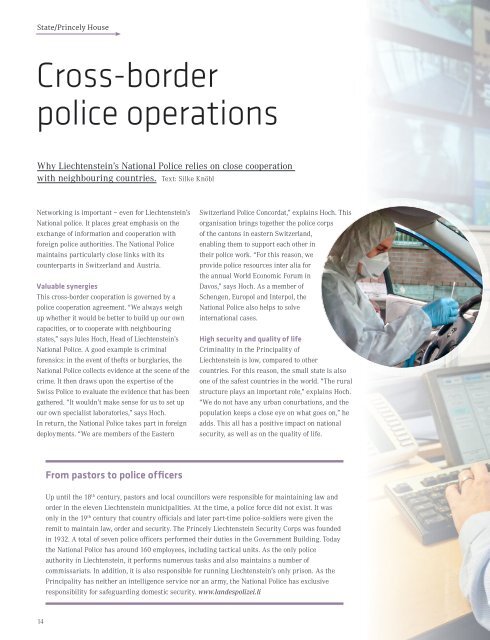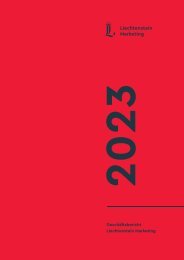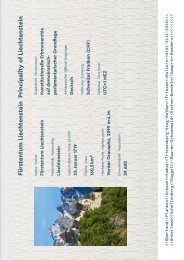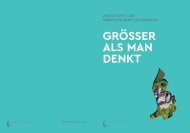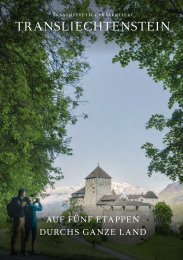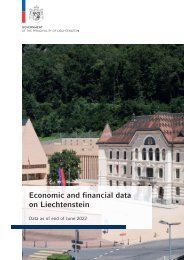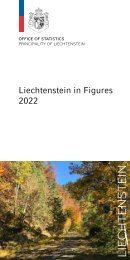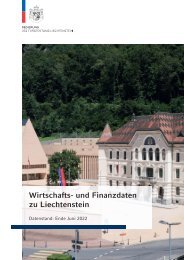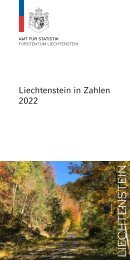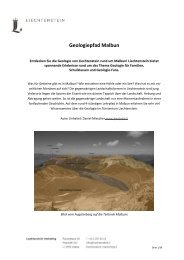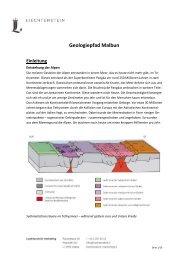oho #3 - The magazine of the Principality of Liechtenstein
The Liechtenstein magazine takes you onto a journey through the country. Find out more about the state, the Princely House, the nature, the culture, the economy and more.
The Liechtenstein magazine takes you onto a journey through the country. Find out more about the state, the Princely House, the nature, the culture, the economy and more.
Create successful ePaper yourself
Turn your PDF publications into a flip-book with our unique Google optimized e-Paper software.
State/Princely House<br />
Cross-border<br />
police operations<br />
Why <strong>Liechtenstein</strong>’s National Police relies on close cooperation<br />
with neighbouring countries. Text: Silke Knöbl<br />
Networking is important – even for <strong>Liechtenstein</strong>’s<br />
National police. It places great emphasis on <strong>the</strong><br />
exchange <strong>of</strong> information and cooperation with<br />
foreign police authorities. <strong>The</strong> National Police<br />
maintains particularly close links with its<br />
counterparts in Switzerland and Austria.<br />
Valuable synergies<br />
This cross-border cooperation is governed by a<br />
police cooperation agreement. “We always weigh<br />
up whe<strong>the</strong>r it would be better to build up our own<br />
capacities, or to cooperate with neighbouring<br />
states,” says Jules Hoch, Head <strong>of</strong> <strong>Liechtenstein</strong>’s<br />
National Police. A good example is criminal<br />
forensics: in <strong>the</strong> event <strong>of</strong> <strong>the</strong>fts or burglaries, <strong>the</strong><br />
National Police collects evidence at <strong>the</strong> scene <strong>of</strong> <strong>the</strong><br />
crime. It <strong>the</strong>n draws upon <strong>the</strong> expertise <strong>of</strong> <strong>the</strong><br />
Swiss Police to evaluate <strong>the</strong> evidence that has been<br />
ga<strong>the</strong>red. “It wouldn’t make sense for us to set up<br />
our own specialist laboratories,” says Hoch.<br />
In return, <strong>the</strong> National Police takes part in foreign<br />
deployments. “We are members <strong>of</strong> <strong>the</strong> Eastern<br />
Switzerland Police Concordat,” explains Hoch. This<br />
organisation brings toge<strong>the</strong>r <strong>the</strong> police corps<br />
<strong>of</strong> <strong>the</strong> cantons in eastern Switzerland,<br />
enabling <strong>the</strong>m to support each o<strong>the</strong>r in<br />
<strong>the</strong>ir police work. “For this reason, we<br />
provide police resources inter alia for<br />
<strong>the</strong> annual World Economic Forum in<br />
Davos,” says Hoch. As a member <strong>of</strong><br />
Schengen, Europol and Interpol, <strong>the</strong><br />
National Police also helps to solve<br />
international cases.<br />
High security and quality <strong>of</strong> life<br />
Criminality in <strong>the</strong> <strong>Principality</strong> <strong>of</strong><br />
<strong>Liechtenstein</strong> is low, compared to o<strong>the</strong>r<br />
countries. For this reason, <strong>the</strong> small state is also<br />
one <strong>of</strong> <strong>the</strong> safest countries in <strong>the</strong> world. “<strong>The</strong> rural<br />
structure plays an important role,” explains Hoch.<br />
“We do not have any urban conurbations, and <strong>the</strong><br />
population keeps a close eye on what goes on,” he<br />
adds. This all has a positive impact on national<br />
security, as well as on <strong>the</strong> quality <strong>of</strong> life.<br />
From pastors to police <strong>of</strong>ficers<br />
Up until <strong>the</strong> 18 th century, pastors and local councillors were responsible for maintaining law and<br />
order in <strong>the</strong> eleven <strong>Liechtenstein</strong> municipalities. At <strong>the</strong> time, a police force did not exist. It was<br />
only in <strong>the</strong> 19 th century that country <strong>of</strong>ficials and later part-time police-soldiers were given <strong>the</strong><br />
remit to maintain law, order and security. <strong>The</strong> Princely <strong>Liechtenstein</strong> Security Corps was founded<br />
in 1932. A total <strong>of</strong> seven police <strong>of</strong>ficers performed <strong>the</strong>ir duties in <strong>the</strong> Government Building. Today<br />
<strong>the</strong> National Police has around 160 employees, including tactical units. As <strong>the</strong> only police<br />
authority in <strong>Liechtenstein</strong>, it performs numerous tasks and also maintains a number <strong>of</strong><br />
commissariats. In addition, it is also responsible for running <strong>Liechtenstein</strong>’s only prison. As <strong>the</strong><br />
<strong>Principality</strong> has nei<strong>the</strong>r an intelligence service nor an army, <strong>the</strong> National Police has exclusive<br />
responsibility for safeguarding domestic security. www.landespolizei.li<br />
14


